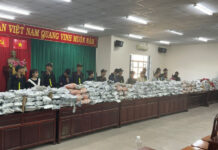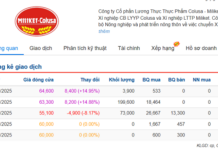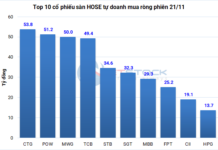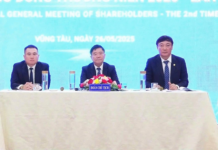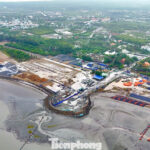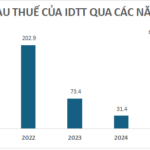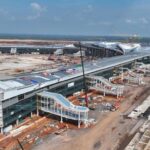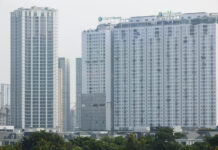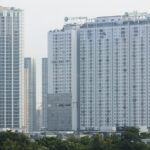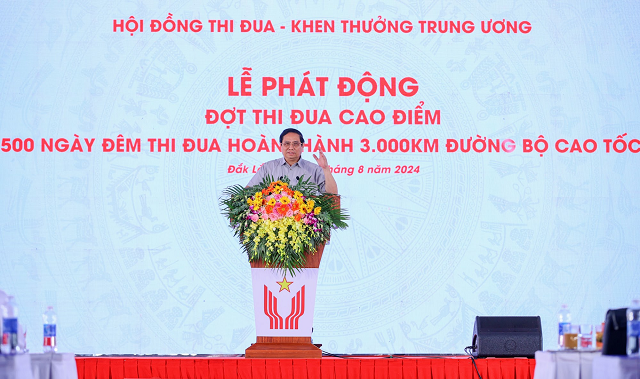During a meeting with the Chairman of the Ho Chi Minh City People’s Committee, Nguyen Van Duoc, and various departments last weekend, Mr. Jun Sung Ho, CEO of Lotte Properties HCMC (Lotte, South Korea) – the developer of the Thu Thiem Eco Smart City project (An Khanh Ward), expressed his desire to continue the project if the city resolves investment hurdles, particularly waiving the 5.4%/year additional land use fee.
100 Projects Affected by Financial Obligations
Chairman Nguyen Van Duoc acknowledged the company’s concerns and pledged to report to higher authorities for appropriate resolution. City leaders welcomed Lotte’s commitment to overcoming challenges and completing the project on schedule.
Lotte’s issue is not unique. Previously, Empire City’s developer – a joint venture known as King’s City – petitioned the Ho Chi Minh City People’s Committee to reconsider its financial obligations. The company stated that since 2017, it has fulfilled nearly VND 3.6 trillion in financial duties, and the land allocation decision explicitly stated no additional payments were required when transitioning from land lease to land use fee payment. Based on this, the project completed and handed over three clusters, totaling approximately 1,200 apartments. However, the additional land use fee demand is a “significant burden,” severely impacting capital flow and business plans.
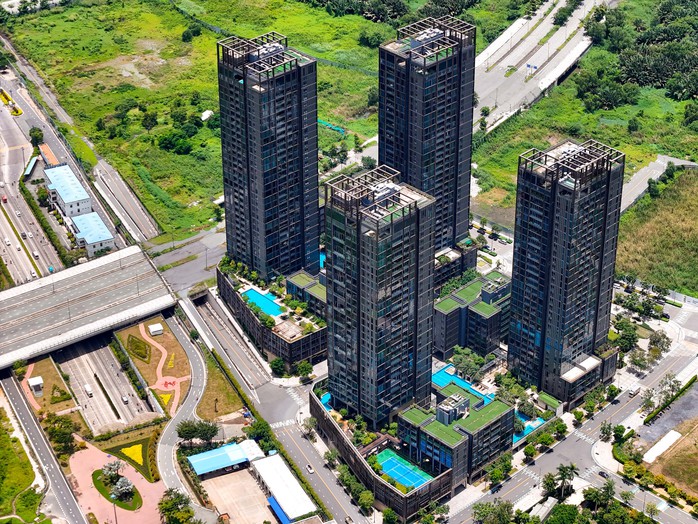
A view of the Empire City project facing procedural challenges. Photo: HOANG TRIEU
Similarly, the Ho Chi Minh City Tax Department recently requested Hung Loc Phat Real Estate Investment Corporation to pay an additional VND 400 billion for the Green Star Sky Garden project. According to the Ho Chi Minh City Real Estate Association (HoREA), approximately 100 commercial real estate projects are awaiting financial obligation notices, including major projects by developers like Novaland, Hung Thinh Land, and TTC Land.
Mr. Le Hoang Chau, Chairman of HoREA, noted that the association has repeatedly advocated for the complete abolition of the 5.4% additional fee for cases where developers are not at fault. He stated, “Delays in determining financial obligations primarily stem from administrative procedures, not developer errors.” This mechanism, according to Mr. Chau, not only harms businesses but also results in budget revenue losses, as land use fees remain “frozen” and cannot be paid promptly, while numerous projects halt construction, wasting land resources.
He believes that if the government resolves this issue, “frozen” projects will swiftly fulfill their financial obligations, unlocking tens of trillions of dong in capital for the real estate market. “Land use fees are key to restoring housing supply and driving economic growth. Resolving this issue will significantly enhance Vietnam’s investment environment,” he emphasized.
The Biggest Bottleneck
Mr. Dang Hong Anh, Chairman of the Vietnam Young Entrepreneurs Association (VYEA) and Founding Chairman of Saigon Thuong Tin Real Estate Corporation (TTC Land), identified land financial obligation issues as the “biggest bottleneck” hindering Ho Chi Minh City’s real estate market development. “Under the 2024 Land Law and Decree 103/2024/ND-CP, land use fees are determined at the time of land allocation. However, many large projects are implemented in phases, requiring new valuations for each land allocation, creating inconsistencies,” he explained.
He cited examples of projects where the city temporarily allocated initial land for developers to commence construction, while the remaining land awaited compensation and site clearance. Upon receiving the first land allocation decision, developers paid land use fees for the entire project based on detailed planning. However, when the remaining land was allocated, authorities imposed additional financial obligations based on new land prices, forcing developers to pay hundreds of billions of dong more, despite the area being included in previous payments.
This situation, according to Mr. Hong Anh, not only increases investment costs and delays implementation but also impacts the entire housing market value chain. “A delayed project harms not only the developer but also triggers a cascade of issues: homebuyers wait, banks restructure loans, supply is blocked, and the market loses liquidity,” he said.
Mr. Dang Hong Anh noted that land use fee issues for temporarily allocated projects have been raised by businesses for years. The Ho Chi Minh City People’s Committee has sent multiple documents to the Ministry of Finance and the Ministry of Agriculture and Rural Development seeking resolution, but no specific guidance has been issued. Consequently, many developers who paid land use fees for entire projects decades ago must now pay additional fees for newly allocated land at current prices, which are significantly higher. This substantial financial burden severely damages businesses, disrupts business plans, stalls projects, and indirectly reduces housing supply in Ho Chi Minh City.
Mr. Dang Hong Anh proposed a special mechanism to address this issue fairly and reasonably. “We urge the Ministry of Finance and the Ministry of Agriculture and Rural Development to promptly submit a mechanism to the Government allowing deduction or offset of previously fulfilled financial obligations based on area for projects that paid full land use fees according to 1/500 detailed planning but have not completed land allocation. This ensures fairness, transparency, and protects the legal rights of both the state and businesses. Only then can we manage budget revenue effectively while encouraging secure investment, fostering socio-economic development, and meeting Ho Chi Minh City residents’ housing needs,” he stressed.
Proposing Complete Abolition of the 5.4% Regulation
At a recent socio-economic press conference, a representative from the Ho Chi Minh City Department of Agriculture and Rural Development stated that the city officially petitioned the Ministry of Natural Resources and Environment and the Ministry of Finance to abolish the 5.4% additional land use fee and land rent during periods of undetermined financial obligations. The city argued that this regulation, intended to “share financial responsibility between the state and individuals,” primarily delays due to administrative agencies. Therefore, businesses and individuals should not bear this additional cost.
The city also emphasized that post-COVID-19 economic recovery efforts would benefit from removing this regulation, reducing cost pressures, stimulating investment, and promoting growth. Currently, the law mandates a 5.4% additional fee, but the Ministry of Finance’s draft amendment to Decree 103 on land use fees and land rent proposes reducing it to 3.6% or abolishing it entirely. However, complete abolition requires direct provision in the Land Law, so the Ministry of Finance has asked the Ministry of Agriculture and Rural Development to consider adding it during the upcoming law revision.
Many experts and businesses argue that delays in determining financial obligations often result from complex administrative procedures, despite developers fulfilling prior land use fee payments. Additional fees increase investment costs, raise real estate prices, directly affect homebuyers, and reduce housing accessibility.
Some experts suggest that if additional fees are applied, they should target projects that have commercialized and profited from the land, preventing land hoarding. However, for cases without developer fault, additional fees are unfair. The most fundamental solution, according to experts, is to completely abolish the 5.4% regulation and establish clear land use fee calculation timelines, ensuring transparency and uniformity. This would unblock stalled projects and restore confidence in the real estate market.
Need for Clearer Regulations
HoREA Chairman Le Hoang Chau emphasized that the draft resolution on mechanisms to address Land Law implementation challenges must clearly outline additional land use fee handling. “The Government should specify deduction of amounts already paid for periods without land use fee or land rent calculations, for cases not due to land users’ fault. This legal basis is essential for resolving projects like Lotte’s Eco Smart City and Empire City, preventing unjust treatment of businesses,” he analyzed.
Proposed Construction of a Cross-Sea Bridge Connecting Can Gio and Vung Tau
Investors have recently proposed a feasibility study for a groundbreaking sea-crossing route connecting Cần Giờ to Bà Rịa Vũng Tàu, to be developed under a Build-Transfer (BT) model.
Vingroup Proposes Construction of Can Gio to Vung Tau Cross-Sea Highway
The conglomerate justifies its investment in the trans-sea route by highlighting its potential to significantly reduce travel time, seamlessly connect Ho Chi Minh City’s functional regions, and foster the expansion of a sustainable urban space.




